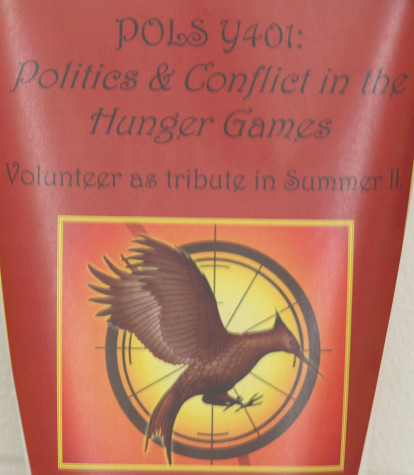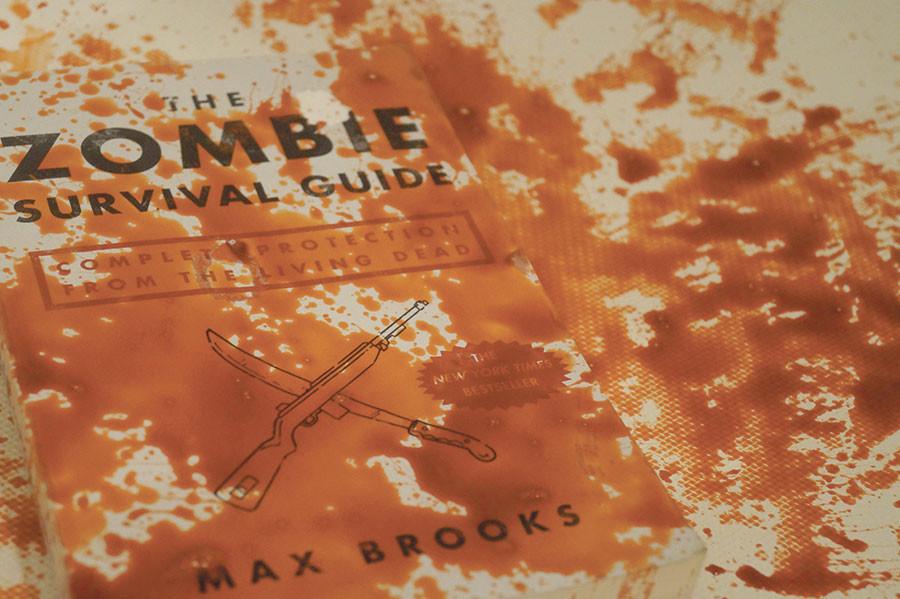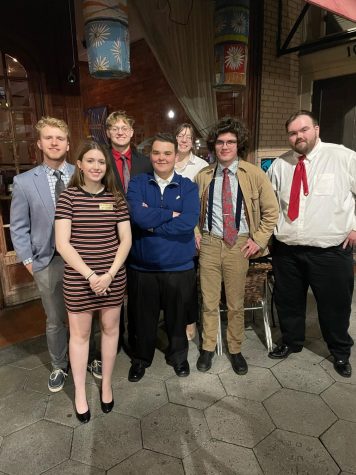Reading, Writing, and Zombie Survival
Unique Classes Offer Uncommon Ways to Earn Your Degree
April 13, 2015
Finding a way to engage occasionally disinterested students in frequently sleep-inducing subjects is a practiced skill that often times requires both a strategic lesson plan and a charming knowledge of certain source material.
For some professors, lecturing about general studies from generalized textbooks, watered down with charts and diagrams, is as uninviting to them as it is for the students listening. This has inspired some faculty members to become creative with their course curriculum’s.
With hundreds of classes being taught on campus, students are given an exciting variety of courses, some of which are pieced together for the sake of managing a new approach to tedious subject matter and others focused on fusing the popular culture of today and tomorrow with existing academia.
Jean Abshire, associate professor of political science and international studies, is one of many staff members with a finger on the pulse of what is or isn’t relevant when it comes to enchanting the interests of classes, which is what led to her piecing together a political science class centered on the notable franchise, The Hunger Games.
“We use the books to look at the various cultural phenomena of the world,” Abshire said. “The course compares and contrasts how the real world measures up with the fictional world of The Hunger Games.”
The class was constructed with the intent of students being able to better understand the conflicting relationships that exist between citizens and government.
The goals of the class surround the wide variety of societal issues, ranging from means of protests and revolutions, to issues regarding justice and the difficulties of rebuilding society post-conflict.
Abshire is interested in exploring the possibilities of having similar courses in the near future, but is foremost concerned with certain bits of criteria being met before committing to teaching a corresponding course.
“For me to do something like this again, there needs to be something with compelling story and explicit political themes that I can draw on,” Abshire said. “It’s fun, not fluff.”
On the other side of campus, in a different department, English professor Jeremy Wells is prepping for a class he will be teaching this fall that will be similar to Abshire’s in obscurity, but very different in core material.
Wells, who is currently teaching a well-received course dedicated to hand-picked works from one of America’s most influential authors, William Faulkner, will be experimenting in subject matter that is relatively new to him in his lectured course focusing on zombies, cyborgs, and most things post humanity.
The class, which will be an upper level seminar, will explore social issues ranging from the understanding of what it means to be human in today’s revolutionary society due to the recent advancements in prosthetic limbs and artificial intelligence, to the digital reanimation of dead celebrities and the recent cultural obsession with all things zombie related.
“The class will read books and look at films in which either cyborgs or zombies are represented,” Wells said. “We are going to think about and discuss the long tradition of literary representation of these figures, starting with Frankenstein.”
In part, the class will be designed to further understand these examples of science fiction that are likely to forever remain in that particular canon, but the main focus of the class seems to rely on one certain curiosity.
“The big question is, especially with zombies: why now? Why is the idea of a zombie so popular? What’s going on,” Wells said.
Wells is hopeful that the course will end up being much more than a senior seminar available to only English majoring students and will ultimately act as a jumping off point for it, and courses like it, to be taught in the near future, which would allow students from the different schools on campus an opportunity to take such a class.
“I would like to offer this as an elective credit or two-hundred level course that anyone could take,” Wells said.
He is optimistic that the course could someday be seen as a general education credit and be offered to a variety of students as a necessary requirement for their degree.
“Science students really getting an opportunity to get a literature credit studying cyborgs and zombies – so disease, medicine, technology, and literature; it would be their chance to be in a literature class that is right up their alley,” Wells said.
“I, and my colleagues in English, we’re thinking long term.”
Michael Hutchins, professor of German and International Studies, is also doing his best to provide new avenues of engagement to students interested in Germanic studies through emphasis on Grimm folklore and German fairy tales.
The course, which has been taught on campus since 2012, focuses on reading the entire collection of the Grimm fairy tales, which adds up to 200 stories or so, each being roughly half a page.
“It’s mainly the collection of stories found in the book and then some secondary literature having to do with it,” Hutchins said.
Similar to the actual interests of the non-fictional Brothers Grimm, Hutchins distinctly put together the course syllabus with the intent some of the lesson plan focusing on the specifics of linguistics and the rest dedicated to the chewy center of the course description, the Grimm fairy tales.
“We talk about the Grimms and their contributions to folklore studies and then also we talk about their contributions to linguistics because they were not just folklorists; they actually composed a grammar of German that went into several editions,” Hutchins said.
The course is currently taught half in English and half in German, seeing as the only students enrolled are those pursuing German as their major or foreign language requirement.
However Hutchins hopes that with the popularity of the course spreading he will be able to able to offer an exclusively English version for students that express interest in learning the folklore of the course and not the linguistics.
“I would love to have more English speaking students join the class and if I would be happy to offer it again if there is a demand for it,” Hutchins said.
For information on any interesting courses being offered during future semesters, visit ius.edu and access the bulletin board, where students can find classes fitting to their interests by searching with a specific word or even key phrase.












